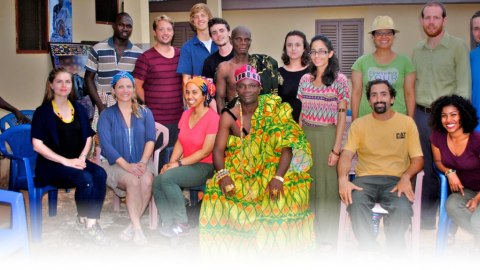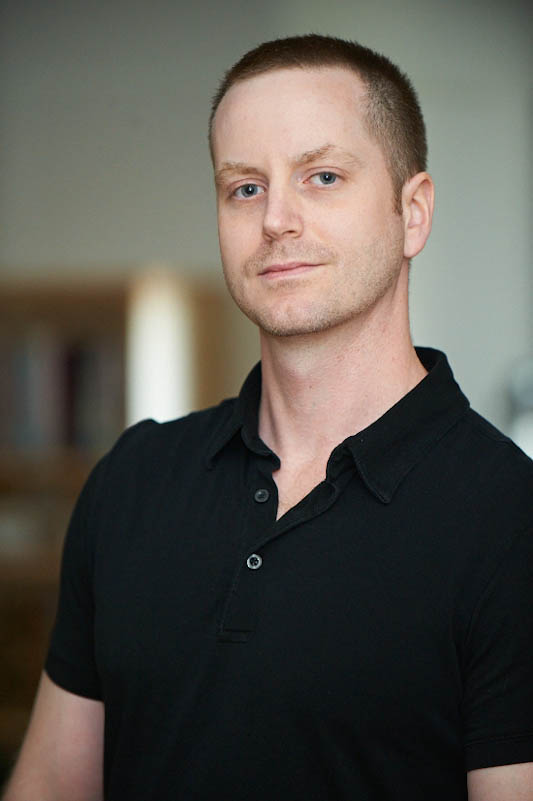Master's Program in International Affairs
APPLICATION DEADLINES:
Apr. 15 - Fall Semester (Regular)
June 23 - Fall Semester (Extended)
Nov. 15 - Spring Semester
About Our Programs
MA in International Affairs Program
The Masters in International Affairs (MAIA) at the Colin Powell School for Civic and Global Leadership is a practical academic program providing high-quality education and training for those interested in pursuing a career in international affairs. Opportunities include international organizations, government, the private sector, the foreign service, or non-governmental organizations.
JD/MIA in Law and International Affairs Dual Degree Program
CCNY’s Colin Powell School and the CUNY School of Law now offer a joint degree in law and international affairs (JD/MIA). The degree combines CUNY Law’s industry-leading program in public interest law with the Colin Powell School’s expertise in international politics. Please keep reading for more information.
Admissions
The Masters in International Affairs at the Colin Powell School for Civic and Global Leadership is looking for students with a strong academic interest in international relations and at least some background in political science, international studies, or related social science. Applicants with some personal or professional experience in international affairs (in government, an international organization, or an international non-governmental organization) are particularly encouraged to apply (although this is not a requirement for admission). We also are particularly interested in applicants seeking a career in international affairs.
Requirements
An undergraduate degree from an accredited college or university anywhere in the world
- A minimum undergraduate grade point average of 3.0 (or its equivalent)
- Three letters of recommendation. Two of the letters should be from a college professor. The third letter can be either from a college professor or from a recent employer.
- A written one or two-page analysis of a particular author, scholar, or published work that has been influential in your interest in pursuing a graduate degree in international relations
- Foreign applicants must take the TOEFL exam and receive a minimum score of 100. The exam ranges from 0-120 on the internet-based test (IBT)
- All applicants are REQUIRED* to take the Graduate Record Exam (GRE) exam. The results have to be within the last two years, with a focus on Verbal Reasoning (scoring within the 80th percentile) and Analytical Writing ( with a minimum of 4.5). The only way you may be exempt from taking the GRE is if you already have a Master's degree
*Due to the Covid-19 pandemic, GRE is currently not required to join the program.
Apply Online
For further information on the application process, please contact the Office of Graduate Admissions at
graduateadmissions@ccny.cuny.edu
Academics
Here you will find information about:
Curriculum | Courses Requirements | Courses
Curriculum
The master's program is designed so that students take courses in sequence. That is, students should endeavor to complete the core requirements before enrolling in electives. While this may not always be possible (sometimes you cannot attend class on the days and times that these classes are offered), this should be a student's goal.
- All students should take Theories of International Relations during their first term in the program.
- All students should take PSM B1877 Quantitative Methods and IR B6800 Research Methods during their first year in the program.
General Knowledge
We begin the program with the study of international relations theory, concepts, and quantitative methods. These courses provide students with the tools to analyze the political and economic institutions and processes that define the international system of nation-states and transnational actors. Our courses on international law offer an in-depth examination of the legal norms and rules that regulate the behavior of states outside their borders. The international organization component has a natural focus on the United Nations and the non-governmental organizations that are all located nearby in midtown Manhattan.
Electives
Within this framework, students will have the opportunity to pursue a more focused concentration in regional studies; international economics; diplomacy and foreign policy; or security and human rights.
Our courses in regional politics enable students to study the major political and economic institutions in their chosen geographical areas. It will also help them to understand the particular political dynamics that define these areas as a region.
Our international political economy courses provide students with the opportunity to study (a) the major international economic institutions such as the World Trade Organization and the World Bank, (b) economic development and (c) the dynamics of the international political economy.
Those who choose to pursue courses in diplomacy and foreign policy will examine diplomatic institutions, negotiations, peacekeeping/peacemaking, and the process and substance of foreign policy decision-making.
Finally, our classes in security and human rights focus on the concept of external threat and the alternatives for addressing them; causes and dynamics of international conflict; and the international efforts aimed at securing basic rights and protections for all peoples regardless of nationality.
Courses Requirements
33 Total Credits
REQUIRED (21 credits)
PSM B1877: Quantitative Methods (3 cr.)
IR B6800: Research Methods (3 cr.)
IR B6100: Theories of International Relations (3 cr.)
IR B6200: International Organization (3 cr.)
IR B6300: International Law (3 cr.)
IR B6927: International Political Economy (3 cr.)
IR B9900: Thesis Writing (3 cr.)
ELECTIVES (12 Credits)
Students must choose four additional classes from the list of courses offered in International Relations and of the approved graduate courses offered by the departments of History, Economics, PSM, and Sociology. Courses may also be taken, by permission, at any CUNY school (6 cr.)
FOREIGN LANGUAGE PROFICIENCY
Students must demonstrate reading proficiency in a language approved by the graduate advisor.
Courses
Following is a sample list of courses offered for the International Affairs degree at The City College:
IR B 6500: Climate Change, Biodiversity and the Political Process - An Interdisciplinary Approach
The purpose of this new course is to bring faculty, students, and experts from the field of environmental studies and biodiversity science together with those in the field of international political policy-making. Policy-making on environmental sustainability must be grounded in a greater understanding of the sciences and the analysis of data on climate change, biodiversity, habitat loss, and other contributing factors to the challenges of extinction, food security, and extreme weather changes. In reverse, the sciences would benefit from a greater understanding of policy-making, international law, the role of the United Nations, NGOs, and the private sector as policies are put into place that impacts biodiversity and environmental sustainability.
Co/Prerequisites: None; 3 CR.
Instructors:
- Dr. Ana Carnaval, City College of CUNY, Department of Biology
Office hours: Fridays 2:00-3:00 PM (please email Ana before coming or by appointment)
E-mail: acarnaval@ccny.cuny.edu " title="Ana Carnaval CCNY email"> acarnaval@ccny.cuny.edu | carolinacarnaval@gmail.com
Webpage: www.carnavallab.org - Dr. Jean Krasno, Colin Powell School of Civic and Global Leadership, City College of New York
Office hours: Tuesdays and Thursdays: 11:00am – 1:00pm (by appointment)
E-mail: jean.krasno@gmail.com
B2502: Latin America and the Caribbean in World Affairs | 2 HR./WK. PLUS CONF.; 3 CR.
Examines inter-American relations and the foreign policies of selected countries in the region. It also explores various themes such as democratization, populism, military authoritarianism, economic development and the relationship of Latin America.
B6100: Theories of International Relations | 2 HR./WK. PLUS CONF.; 3 CR.
Offers an introduction to contemporary theories and concepts in the discipline of international relations. In particular, the course examines the competing paradigms offered by realism, liberalism, globalism, the English School, and constructivism. The course is designed to advance students’ knowledge of international relations by focusing on the ways in which theory can help them grasp the complexities of relationships among states and other international actors.
B6200: International Organizations | 2 HR./WK. PLUS CONF.; 3 CR.
Analyses the major global and regional organizations and institutions that provide for cooperation among states, with an emphasis on the United Nations system. In particular, the course examines how these organizations attempt to address problems of peace and security, economic and social development, human rights, and humanitarian assistance.
B6300: International Law | 2 HR./WK. PLUS CONF.; 3 CR.
Examines the role and function of public international law in regulating the relations among sovereign states. Among other areas, the course focuses on the rights and duties of states, multilateral treaties, sovereignty, human rights, the laws of warfare, the use of force, refugees, and international criminal tribunals.
B6600: Internship | Permission of the program director. 3 CR.
Students may earn three credits for an internship with an international organization, non-governmental organization, government agency, or policy think tank involved in the practice of international relations. Those doing so must get permission from the Program Director and work seven hours at the agency. The student must provide to the MPIR office a letter from the agency/organization confirming his or her appointment and outlining his or her duties.
B6917: Africa in World Affairs | 2 HR./WK. PLUS CONF.; 3 CR.
Analyses the political relations among black African states and between such states and the Western powers. Topics include: imperialism, slavery, and colonialism; wars of independence; inter-state relations and economic cooperation; and the role of international organizations in promoting human rights and the resolution of conflicts.
B6918: The Practice of Diplomacy | 2 HR./WK. PLUS CONF.; 3 CR.
Examines how international relations are conducted at the dawn of the 21st century, from both a theoretical and empirical perspective. In doing so, the course provides students with an understanding of the principles that underlie the practice of diplomacy in bilateral and multilateral settings and the concrete tools and processes utilized by diplomats in the course of their work.
B6925: Peacemaking and Negotiation | 2 HR./WK. PLUS CONF.; 3 CR.
Examines efforts by regional and international organizations to facilitate negotiation and peacekeeping in the pursuit of international peace and security. It covers the period from the U.N.’s first inception up to current operations in the field, focusing on the Middle East, Africa, Central America, the former Yugoslavia, Cambodia, East Timor, and elsewhere.
B6927: International Political Economy | 2 HR./WK. PLUS CONF.; 3 CR.
Explores the theories that attempt to explain the dynamics of the international economy, and examines the institutions that provide for cooperation in facilitating international trade, monetary exchange, and investment. It pays particular attention to the role of the World Trade Organization, the World Bank, the International Monetary Fund, and U.N. development agencies. Finally, it examines the debates around globalization.
B6928: Human Rights in World Politics | 2 HR./WK. PLUS CONF.; 3 CR.
Explores the development and implementation of human rights norms within the international system. It also discusses the debates surrounding the concept of human rights in world politics and investigates efforts by states, international organizations, and non-governmental organizations to implement such norms at the national, regional and international levels.
B6930: Europe in World Affairs | 2 HR./WK. PLUS CONF.; 3 CR.
Examines the role of the European community and its major states in world politics. in particular, the course explores the development of European politics from the Napoleonic period in the early nineteenth century through the creation of the European Union in the late twentieth century. Topics will include interstate war, security, economic integration and political relations among the states.
B6931: Alternative Conceptions of International Security | 2 HR./WK. PLUS CONF.; 3 CR.
Explores the various conceptions of international security offered by scholars, policy analysts, journalists, and activists from different parts of the world. The class includes traditional concepts such as deterrence, arms races and arms control, alliances, warfare and balance of power, as well as more contemporary notions such as human security, environmental security, community violence, civil war and weapons of mass destruction.
B6933: Decision-Making and Foreign Policy | 2 HR./WK. PLUS CONF.; 3 CR.
Examines the theory and practice of decision making and how it affects the formation of foreign policy. Grounded in the literature on political psychology, it explores personality, group dynamics, and perception and misperception, and investigates how belief systems establish a framework for how policymakers make decisions.
B6934: State-Building and Democratization | 2 HR./WK. PLUS CONF.; 3 CR.
Examines questions of state power, democratic institutions, and their relationship in contemporary comparative international relations. The course is divided into three sections: (1) origins, definitions and theories of state and democracy; (2) dynamic changes in state and democratic politics, particularly those that have occurred over the past several decades; (3) world of policy, investigating prescriptions that have emerged in an effort to produce broader and more complete democracies.
B9900: Thesis Research: Approval of the program director.
JD/MIA Dual Degree Program
Students must be accepted into both CUNY Law Program and Colin Powell School for Civic and Global Leadership's MIA Program.
CCNY’s Colin Powell School and the CUNY School of Law offer a joint degree in law and international affairs, combining CUNY Law’s industry-leading program in public interest law with the Colin Powell School’s expertise in international politics. The dual degree program focuses on core issues in contemporary politics, including international law, human rights, and security. The goal is preparing lawyers for emerging career opportunities in government, international organizations, advocacy groups, and the private sector as well as offer students practical advantages such as:
- Receive two degrees in less time. Save one year of study pursuing the JD/MIA.
- Capitalize on two institutions’ expertise. Learn from experienced international policy and law practitioners.
- Competitive tuition. The annual cost is 70% less expensive than some other joint degree programs.
Curriculum
33 Total Credits
24 credits from CCNY MIA:
REQUIRED (24 credits)
IR B6100: Theories of International Relations (3 cr.)
IR B6200: International Organization (3 cr.)
IR B6300: International Law (3 cr.)
IR B6927: International Political Economy (3 cr.)
PSM B1877: Introduction to Quantitative Methods (3 cr.)
ELECTIVES (9 credits)
A list of sample course offerings can be found here. (9 cr.)
9 Transfer Credits from CUNY Law
Application Requirements
CCNY MIA
- An undergraduate degree from an accredited college or university anywhere in the world
- A minimum undergraduate grade point average of 3.0 (or its equivalent)
- Three letters of recommendation. Two of the letters should be from a college professor. The third letter can be either from a college professor or from a recent employer.
- A written one or two-page analysis of a particular author, scholar, or published work that has been influential in your interest in pursuing a graduate degree in international relations
- 500-word statement of how the JD/MIA will advance the applicant’s career goals
- Foreign applicants must take the TOEFL exam and receive a minimum score of 100. The exam ranges from 0-120 on the internet-based test (IBT)
- GRE not required. However, LSAT is required by CUNY Law
CUNY Law
Please visit CUNY Law's Application Requirements Checklist for detailed information.
Apply
CCNY MIA - Apply Online
For further information on the application process, please contact the Office of Graduate Admissions at
graduateadmissions@ccny.cuny.edu
CUNY Law - APPLY Online
Non-Matriculated Students
A limited number of people who are not currently in the program are allowed to take classes as non-matriculated (also known as "non-degree") students. These slots are reserved for those who are planning to apply to the program in the following semester. If accepted, you may register for up to two classes (six credits), with no exceptions.
Also, registration for classes is subject to availability. Some or many of the classes may be closed by the time you seek to register.
In order to be considered for non-degree status, you must:
- Not require an F-1 Visa
- Have an undergraduate degree with a minimum 3.0 GPA (or its equivalent)
- Obtain the authorization of the Program Director, Jean Krasno at Jean.Krasno@gmail.com
- Agree to apply for admission into the program for the following semester
- Pay the application fee of $125
- Fill out the application and submit it alongside all undergraduate transcripts
Being accepted as a non-matriculated student does not guarantee acceptance into the MIA Program. After completion of the classes, you must still apply through the Graduate Admissions Office. The MIA committee will evaluate you based on your application file.
If you are accepted into the MIA Program, the credits you earn will be applied to your degree. If you are denied admission, you may not take any further classes.
Current Students
Here you will find information about:
Registration Procedures | Master's Thesis Guidelines
Language Requirement | General Policies
Registratrion Procedures
Course List: For a complete and updated list, please check the Schedule of Classes on CUNYfirst. The list is updated every six months, mid-term.
When to Register: We recommend that all current students register for their classes during the registration period that is held the semester before. Either way, you should register no later than one week prior to the beginning of classes. With few exceptions, anyone registering later than this will not be allowed into a course that is full. In other words, we will not approve an overtally for anyone registering beyond this deadline.
Financial Aid: Make sure your financial aid is in order. If you have any questions about your financial aid, call (212) 650-5819/6656 or visit the Financial Aid Office, A-104.
Stops: Make sure there are no STOPS on your record that would delay your registration. Clear all STOPS prior to registration. If you have any STOPS they will be listed on your registration appointment letter; you can also verify them by going online to view your records at the “I” desk in the NAC 1/205. To contact the Registrar’s please click here. To contact Bursar Office please click here.
Blackboard: If you need to contact Blackboard call 212-650-7878 or bbsupport@ccny.cuny.edu or reach out to the IT Service Desk at servicedesk@ccny.cuny.edu
E-Permit Registration for Graduate Courses at Other CUNY Colleges: If you wish to take courses at the Graduate Center or graduate-level courses at other CUNY institutions, you must first obtain the approval of BOTH the professor teaching the course AND the director of the MIA program. You need to register for an E-Permit.Master's Thesis Guidelines
Master's Thesis
All students in the program must write a master's thesis of approximately 40 pages on a topic of their choice (in consultation with your faculty mentor). The thesis process involves the following:
Choosing a Mentor
Students must choose a faculty mentor with whom they will work during the thesis process. You choose your mentor, then register for the section of Thesis Writing (B9900), which is available for you in the MIA office, NAC 4/146. A second reader will be provided by the MIA. Both your mentor and the second reader must approve your final manuscript prior to it being accepted.
Guidelines
The Master's Thesis must include the elements listed below in the order listed:
- A cover page that includes the following: (1) the title, (2) your name, (3) the month and year of graduation, (4) the name of your thesis advisor, and (5) the phrase, "Submitted in Partial Fulfillment of the Requirements for the Degree of Master of International Affairs at the City College of New York"
- Table of contents
- 250-350 word abstract
- Text of thesis
- Bibliography
In addition: - Double-spaced text
- Divided into chapters, with each chapter beginning on a separate page
- Chapter headings should be centered, bold, and underlined
- Subheads should be aligned left and underlined.
- Do not use any other headings in your manuscript.
- Page numbers should appear on the bottom center of every page.
- The left margin of ever page should be 1½ inches; the other margins should be 1 inch.
- Use footnotes rather than endnotes as your citation style.
- Include a conclusion at the end of your manuscript.
Language Requirement
The MA Program in International Affairs has a foreign language requirement which is fulfilled during the program and is not a requirement within the application process. The language requirement can be achieved in three ways: 1) taking a short written exam offered by CCNY each semester, translating from the foreign language into English; 2) taking one semester of a language and achieving at least a B; or 3) providing the MA Director with a high school diploma from the country where you attended high school that was taught in
that country’s language
Internship
Our program encourages students to pursue internship possibilities with relevant local or international organizations or government agencies. We will give three credits for approved internships, which may be used in lieu of an elective. You may only pursue an internship after you have completed all of your core courses. The program staff can help you locate approved internship opportunities. However, you are free to pursue your own opportunities so long as they meet the standards expected by the program.
Please contact the staff in advance to ensure that your internship qualifies for course credit.
At the completion of the the internship, students must submit a brief paper outling their responsibilities and discussing the experience they gained.
General Policies
Minimum 3.0 GPA: If you cannot maintain the minimum required grade you may be denied permission to register for further courses.
Time for Completion: You are required to complete your degree within three years of your first semester. Extension of time may be granted in exceptional circumstances, but this is at the discretion of the Program Director and the Dean of the Colin Powell School for Civic and Global Leadership. The MIA will not accept any courses for a degree that are more than five years old.
Plagiarism: We consider plagiarism (copying another person's work or ideas without giving him or her proper credit) to be among the most serious offenses one can commit as a student. The penalties for plagiarism range from (1) an F on the paper or assignment (2) an F in the course or (3) expulsion from the program. Plagiarism within a student's master's thesis will result in a recommendation for expulsion.
Incompletes: We strongly discourage taking incompletes in any course. If you must have an incomplete (with the permission of the instructor teaching the class), you must make up your incomplete by the end of the following semester. You will not be allowed to register for future classes if you have an unresolved incomplete that is more than one semester old. Please be aware that incompletes automatically turn into an "F" (FIN) after one year. Appeals to change INC grades must be submitted within one year. Late appeals will not be considered.
Passing Grade: For all graduate courses at City College, students must achieve a C+ or better in order to get credit for the course. This means that students in the program who receive a C or below in a required core course must retake it. If you receive a C or below in an elective class, you may substitute another course. In either case, the course in which you received the C or below will not count toward your 30 credits.
Alumni Profiles
We prepare our students for a variety of careers
in the public, private, and non-profit sectors.
Meet some of our alumni below.
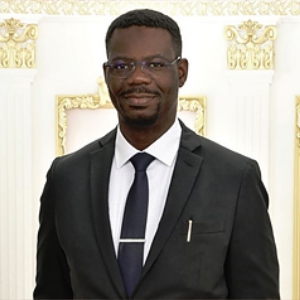 Olalekan Afolabi '13, MIA
Olalekan Afolabi '13, MIA
Foreign Service Officer
U.S. Department of State
Olalekan earned a BA in International Studies and BA in Political Science at CUNY-College of Staten Island. His interests included international organizations, politics, law, and social development therefore he soon decided to join the Master’s in International Relations program at the Colin Powell School because of the quality education, the necessary pedigree, and affordability. His thesis topic was Terrorism in Nigeria: Culmination of Economic Disenfranchisement, Social Marginalization and Political Instability. Please click here to read more about Olalekan’s journey and experience at the Colin Powell School.
"I would recommend the IR program at the Colin Powell School to an interested student because not only would a student learn all the tools necessary to function in today’s world, but they would also learn the true meaning of leadership, service and commitment not only to oneself but also to the community".
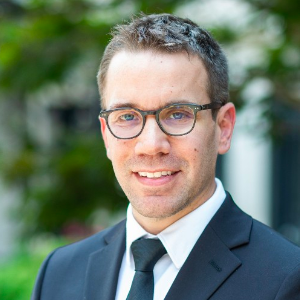 Steven Magerl '15, MIA
Steven Magerl '15, MIA
Program Specialist
US Agency for International Development
After eight years of working in finance, Steven decided to transition to a career in global affairs, a journey that began by enrolling in the Colin Powell School for Civic and Global Leadership. Through his studies, he learned how to analyze the dynamics of the international system and the impact of world events. He was also able to participate in a volunteer/study program in Ghana, helping to improve a local school. Steven’s favorite part of the program was his exposure to a diversity of ideas, from both the professors and students.
Steven wrote his thesis on the impact of the local political economy on development interventions in Ghana and Ethiopia. He was able to draw on knowledge gained through his research to successfully design and implement a project in the South Pacific nation of Vanuatu, as a Peace Corps volunteer. Steven currently works for the US Agency for International Development, where he strives to deliver aid to countries suffering from natural disasters and complex emergencies. Steven recommends enrolling in an MA at the Colin Powell School, as it provides a well-rounded and practically-minded tool kit for working in international affairs.
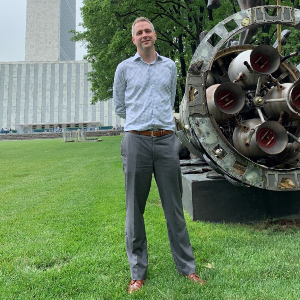 Samuel Martell '06, MIA
Samuel Martell '06, MIA
Political Affairs Officer
With responsibility for the Korean Peninsula/DPRK, in the Northeast Asia and the Pacific Team of the United Nations Departments of Political and Peacebuilding Affairs and Peace Operations.
Mr. Martell served as Political Officer for the Horn of Africa, with responsibility for Egypt, from 2012 to 2014. He supported the Secretary-General’s Special Representative and activities of the United Nations Political Office for Somalia (UNPOS) from 2010 to 2012. Previously he supported the Secretary-General’s High-level Coordinator regarding repatriation and return of all Kuwaiti and third-country nationals, or their remains, and on the return of all Kuwaiti property. He was selected for the international civil service with the United Nations Secretariat through competitive examinations in 2009.
Prior to joining the United Nations, he worked as a researcher for the Kofi Annan Papers Project in 2006, under the direction of Dr. Jean Krasno, and as a Manager for the British Airports Authority from 2003 to 2004.
Mr. Martell received his MA in International Relations in 2006 from The City College of New York, Colin Powell School for Civic and Global Leadership, and graduated from Edinburgh Napier University with a BA (Hons) in Communication in 2001. He is married and has three sons.
 Zareen Iqbal '08 MIA
Zareen Iqbal '08 MIA
Attorney-Advisor
National Aeronautics and Space Administration (NASA)
Marshall Space Flight Center
Zareen is originally from the New York City area, which is where she attended college. She obtained her Bachelor’s and initial Master’s Degree in Forensic Psychology from John Jay College in 2003. Upon graduation, Zareen served as a Deputy United States Marshal with the United States Marshals Service for approximately 3 years in the Northern District of California. After leaving the US Marshals Service in 2006, Zareen obtained her Master’s degree in International Relations (”IR”) from the City College of New York. While at CCNY, Zareen conducted work for the Institute for Defense and Disarmament Studies and worked for Dr. Jean Krasno in support of the Kofi Annan Papers Project. Her thesis focused on the formation of a standing UN peacekeeping force.
Immediately upon graduating from the IR program, Zareen accepted a position with the United Nations Food and Agricultural Organization for Somalia, where she worked in both Kenya and Somalia in the area of food security. Following this, she continued her work in the area of African Affairs for such organizations as FXB International, the International Institute for Justice and Development and US Department of Defense, US Africa Command. She later returned to Somalia in 2012 in support of African Union Mission in Somalia ("AMISOM") counter terrorism and stabilization efforts. In 2016, she graduated from the 2-year accelerated JD program at Brooklyn Law School, with a certification in International Law, and following this, served as an Assistant District Attorney for the Office of Special Narcotics Prosecutor in NYC for over two years. Since 2018, Zareen has worked as an Attorney-Advisor for the National Aeronautics and Space Administration ("NASA") at the Marshall Space Flight Center, specializing in international law, procurement, ethics and litigation. She was also recently accepted into the US Air Force's part-time Judge Advocate General ("JAG") reservist program.
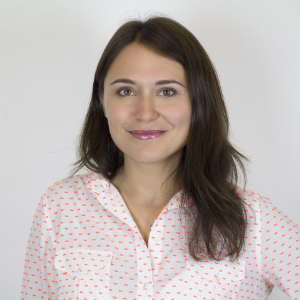 Alena LeBron '15, MIA
Alena LeBron '15, MIA
Program Management Assistant
Office of the Under-Secretary-General
Department of Political and Peace-building Affairs, United Nations
“I wanted to work at the United Nations and was looking for an affordable graduate program that would advance my knowledge, strengthen my communication skills and, perhaps, provide networking opportunities in the field of international relations. The Masters in International Affairs at the Colin Powell School for Civic and Global Leadership was a perfect fit”.
Alena moved to New York from Novosibirsk, Russia, where she earned a bachelor’s degree in European Studies. As a graduate student at City College, Alena pursued internships at the United Nations Women and United Nations Population Fund where she learned about the inequality issues that women face all over the world. A strong interest in gender disparities inspired her to write her master thesis about human trafficking and domestic violence in the post-communist countries, with an emphasis on Russia and the Czech Republic.
In the summer of 2012, Alena traveled to Accra, Ghana, with a peer group under the supervision of Prof. Jean Krasno to learn about the modern democracy in Africa and traditional forms of governance and to conduct research on women’s representation in governmental structures. “That experience has been remarkably fulfilling. While interviewing the members of the local government and nonprofit organizations, I have strengthened my communication and research skills, as well as an ability to critically evaluate information”.
Since graduation, Alena has been involved in work around global health issues, such as human trafficking, disability rights, and HIV prevention in several non-profit organizations and is currently employed in the Office of the Under-Secretary General, Department of Political and Peacebuilding Affairs, at the United Nations. Alena is a focal point for Africa and Electoral Assistance in the correspondence team, reviewing correspondence and ensuring its compliance with the UN protocol.
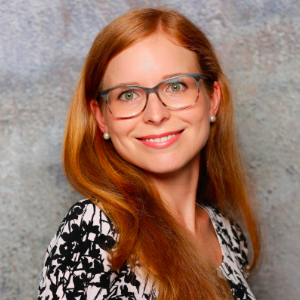 Elisabeth Szeli "18, MIA
Elisabeth Szeli "18, MIA
Translator
Department for General Assembly and Conference Management, United Nations
“What I liked most about the international relations program, was the diversity of students. My classmates came from four continents, had backgrounds in diplomacy, immigration law, women’s rights, the Army, journalism and documentary filmmaking. The diversity of backgrounds and life experiences made our discussions about politics and human rights so much more animated and inspiring. This is how I will always remember City College: as a place where everybody is welcome and where we learned not just from our professors and our books, but from each other.”
Elisabeth come to New York to work for the United Nations as a language professional. She quickly realized that to succeed in the organization, she needed more substantive knowledge about international law, development, arms control, and peacekeeping as a result she decided to go back to college to pursue Master’s in International Affairs. The City College was her first choice because of its employment-friendly schedule: all classes took place in the late afternoon or evening, allowing her to keep her job at the UN while studying. The classes about Africa, nuclear security and peacekeeping were among her favorite, and highly relevant for her professional career.
It was the course on nuclear security with Prof. Jean Krasno that inspired Elisabeth's thesis topic. Thanks to her thesis research on nuclear disarmament, she became immersed in this field which has become her area of expertise. She is now co-authoring a book entitled “Banning the Bomb: The Treaty on the Prohibition of Nuclear Weapons,” which will be available in 2020.
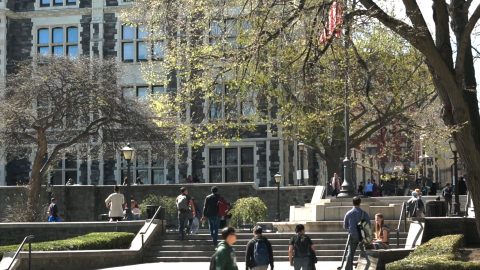
Last Updated: 10/05/2023 11:33
